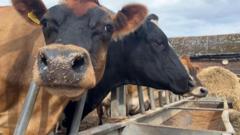Is a Bluetongue Outbreak Looming? Here's What You Need to Know!

Bluetongue Restrictions Impacting Livestock Movement from England to Wales: A Comprehensive Overview
The recent announcement of bluetongue restrictions on livestock movement from England to Wales has stirred considerable unrest within the agricultural community. As of July 1st, all cattle, sheep, and goats being transported across the border must test negative for bluetongue prior to movement into Wales. This policy, while aimed at preventing the disease from spreading into Welsh territory, has raised alarms among farmers and opposition politicians regarding the potential repercussions on cross-border trade and the overall livestock industry. In this article, we will delve into the implications of these restrictions, the disease in question, and the sentiments expressed by various stakeholders in the farming community.
Understanding Bluetongue Disease
Bluetongue is a viral disease transmitted primarily by midges, which affects ruminant animals, particularly sheep and cattle. Although it poses no risk to food safety or human health, the disease can be fatal for livestock, causing significant morbidity and mortality. The symptoms of bluetongue can vary, but they often include fever, swelling of the face and tongue, and respiratory distress.
The Current State of Bluetongue in the UK
As of 2023, bluetongue has spread across large parts of England, leading to the designation of a restricted zone (RZ) that limits animal movements. The RZ has expanded over recent months, prompting the UK government to implement a comprehensive policy to manage the outbreak and prevent further spread. Notably, Wales has managed to remain bluetongue-free this year, and the Welsh government is keen on maintaining this status for as long as possible.
The Impact of Movement Restrictions
Farmers and industry experts have expressed grave concerns over the newly instituted movement restrictions. The Welsh government’s decision to require negative tests for livestock moving from England to Wales is viewed as a necessary precaution to protect the health of Welsh livestock. However, it has also raised fears of significant disruption to trade, particularly for farms situated along the border.
Economic Consequences for Farmers
- Increased Costs: Farmers will now need to obtain and pay for pre-movement tests and licenses, adding a financial burden that could be detrimental to many operations.
- Trade Disruption: With over 550 farms on the border relying on summer trading, the restrictions could severely limit their market access and sales potential.
- Long-term Viability: The ongoing movement restrictions may threaten the viability of certain farms, particularly smaller operations that may lack the financial resources to cope with such changes.
Voices from the Farming Community
The debate surrounding these restrictions has been heated. Plaid Cymru MP for Caerfyrddin, Ann Davies, articulated the frustrations of her constituents, highlighting the persistent challenges faced by Welsh farmers. According to Davies, the “disruption” caused by these movement restrictions will be “devastating,” emphasizing the need for compensation schemes to support affected farmers.
In response, Deputy Prime Minister Angela Rayner assured that the UK government would support Welsh farmers, though specifics on how this support would manifest remain vague. This lack of clarity has left many in the farming community feeling uncertain and anxious about the future.
The Political Landscape
The issue has sparked significant political debate within the Welsh Assembly. Rural Affairs Secretary Huw Irranca-Davies defended the decision to impose movement restrictions, describing it as a “finely-balanced decision” aimed at safeguarding Welsh livestock from bluetongue.
Criticism from Political Opponents
Opposition parties have not held back in their criticism of the restrictions. Welsh Conservatives MS Andrew RT Davies likened the situation to a retailer being told they cannot stock essential goods during a peak trading period. He described the decision as placing the livestock industry “on the altar of stupidity.”
Plaid Cymru’s rural affairs spokesman, Llyr Gruffydd, echoed these sentiments, arguing that the Welsh government had failed to adequately prepare for the inevitable arrival of bluetongue. He called the decision “the wrong call,” pointing out that the farming community had long been aware of the risks posed by the disease.
Concerns from the Liberal Democrats
Jane Dodds, the leader of the Welsh Liberal Democrats, also voiced her concerns in the Senedd, emphasizing that the stress and anxiety faced by farmers on the border are palpable. Many of her constituents rely heavily on livestock trading, and the new restrictions have created an atmosphere of uncertainty and frustration.
Preventative Measures and Future Considerations
While the decision to impose movement restrictions has been contentious, it is essential to consider the broader context of disease management in livestock. Preventative measures are crucial in safeguarding the health of livestock and ensuring the sustainability of the agricultural sector. Here are some potential strategies and considerations for farmers moving forward:
- Regular Health Monitoring: Farmers should implement routine health checks and vaccinations to minimize the risk of bluetongue and other diseases.
- Biosecurity Measures: Enhancing biosecurity protocols on farms can help prevent the introduction of diseases from external sources.
- Collaboration with Authorities: Engaging with governmental bodies and agricultural agencies can facilitate access to vital information and support regarding disease management.
- Compensation Schemes: Advocacy for compensation schemes for affected farmers can alleviate some of the financial burdens stemming from movement restrictions.
Conclusion
The bluetongue restrictions on livestock movement from England to Wales have brought significant challenges to the farming community. While the policy aims to protect Welsh livestock from the disease, it also poses severe economic implications for farmers reliant on cross-border trade. As the situation unfolds, the need for collaboration between the Welsh and UK governments becomes increasingly apparent, particularly in terms of support measures for affected farmers. The future of Welsh agriculture hangs in the balance, and stakeholders must remain vigilant as they navigate these uncertain waters.
FAQs
What is bluetongue disease, and how does it affect livestock?
Bluetongue is a viral disease transmitted by midges, affecting ruminants like sheep and cattle. Symptoms can include fever and swelling, and while it’s not a threat to human health, it can be fatal to livestock.
What are the new movement restrictions for livestock in Wales?
As of July 1, 2023, all cattle, sheep, and goats moving from England to Wales must test negative for bluetongue disease before being transported.
How are farmers reacting to the bluetongue restrictions?
Farmers have expressed severe concerns about the economic impact of the restrictions, emphasizing the potential for devastating trade disruptions and increased costs associated with testing and licensing.
What can farmers do to mitigate the risks of bluetongue?
Farmers can implement regular health monitoring, enhance biosecurity measures, collaborate with authorities for information, and advocate for compensation schemes to manage the impact of the restrictions.
As the agricultural sector adapts to these challenges, how can farmers leverage community support and government resources to safeguard their livelihoods? #Bluetongue #Farmers #Agriculture
Published: 2025-06-18 14:16:07 | Category: wales



